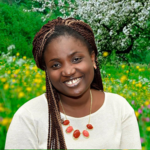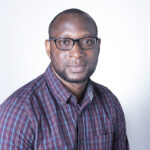The mission of the CRoME Lab’s Black family health Advisory Board (BAB) is to elevate the voices of Black and African families in healthcare research. BAB members offer insights from their unique socio-cultural backgrounds to aid CRoME Lab researchers in formulating research questions, reviewing materials, and designing studies that are culturally sensitive, respectful, salient, and applicable to Black and African families.
Eva Vivian, PharmD, MS, PhD
Dr. Eva Vivian is currently a Professor at the University of Wisconsin-Madison School of Pharmacy. She received her Doctor of Pharmacy degree from the University of Illinois College of Pharmacy, Master of Science from the University of Wisconsin School of Medicine and Public Health, and Doctor of Philosophy from the University of Wisconsin School of Human Ecology. She is certified in diabetes care and education and advanced diabetes management. Dr. Vivian’s research interest focus on identifying disparities in the treatment of hypertension, diabetes, and other chronic diseases among ethnic minorities, particularly African American and Latino American patients and developing and implementing strategies to reduce and eliminate them. Recently, her research has sharpened its focus in response to heightened awareness of the great numbers of children and adolescents who are at special risk of diabetes.
Dr. Vivian currently serves on the Editorial Board of Diabetes Care. Dr. Vivian has lectured at medical meetings, conferences, and symposia across the United States. Dr. Vivian has held numerous leadership positions within professional associations. She served on the Board of Directors of the American Association of Diabetes Educators during 2011-2013. She is also a member of the American Diabetes Association, American Pharmacy Association, American Association Colleges Pharmacy and American College of Clinical Pharmacy.
Motolani Ogunsanya, PhD
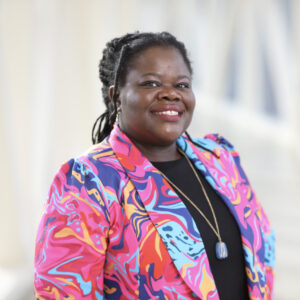
Adeola Agoke, PhD
Adeola Agoke holds a PhD in African Cultural Studies with a specialization in sociocultural and applied linguistics. Her book manuscript tentatively entitled “Learners Linguistic Creativity: Implications for Language Learning and Pedagogical Practices” draws on ethnographic fieldwork and data analysis, to examine the processes by which language learners engage their multilingual repertoire for interactional practice in- and out-of-classroom settings. Focusing on Yoruba language learners, her research draws theoretical insights from critical applied linguistics and critical discourse analysis to challenge the convention that demarcates language use in formal domains from language use in “the wild,” an older model that constructs language use in specific environments as ethnolinguistic boundedness. She argues that learners’ linguistic creativity constitutes important linguistic resources for developing the standard dialect and effective pedagogical practices within the classroom environment.
With an interest to bring research into African Language Programing, Dr. Agoke currently curates learning resources in African languages to enhance contextualized experience of language learning. Also, as former Fulbright scholar, she is very interested in language internationalization, global citizenship and decolonization of teaching curriculum to enhance multi-representation of voice, bodies, and in fact experiences of African language learners in and outside of classroom settings. Her ongoing research on classroom social dynamics and instructed SLA foregrounds this perspective.
Kazeem Kẹ́hìndé Sanuth, PhD, MA
Kazeem Kẹ́hìndé Sanuth holds a Ph.D. in Second Language Acquisition (SLA) with a combined minor in the pedagogy of Less Commonly Taught Languages from the University of Wisconsin-Madison. He also has an M.A. in African Languages and Literature from the same university. His research explores the social, cultural, and linguistic implications of language study abroad in a multilingual West African setting.
Dr. Sanuth has been involved in language education and internationalization as a classroom instructor, a coordinator, and an administrator of language education programs. Before transitioning to NALRC, he served as the International Education Outreach Administrator with the Hamilton Lugar School of Global and International Studies (HLS), Indiana University-Bloomington.
Kazeem’s mission is to further raise the profile of the NALRC, to enhance supports for scholarship and practice in the field of African language pedagogy, and to broaden access to the center’s resources.
Abimbola Fapohunda, PhD
My research, teaching and consulting work is focused on health inequities affecting African Americans in the U.S., Africans in the Diaspora, and on the continent. My training and education, community engagement, and work experience influence my teaching and research interests. I have worked on two multidisciplinary collaborative studies that address the historical and contemporary struggles of Black and Brown communities in Pittsburgh (The Black Women, Femmes and Individuals Health Projects and the Pittsburgh Transformations Project: Race, Migration, Education, and Healthcare).
In my international health research work, I collaborated with two organizations: Gift of Living Donation (GOLD), United Kingdom, focusing on living organ donation among Blacks and Lakeshore Cancer Center (LCC), Nigeria, focusing on cancer care. My work with LCC included developing an e-learning training program on cancer awareness, diagnosis, and treatment for Nigerian healthcare practitioners.
Kelechi Ibe-Lamberts, PhD

Karosibina Abraham, MBA, CPIM
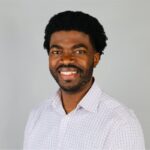
Victor Ujor, PhD
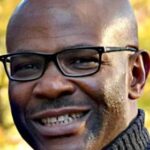
Dr. Ujor’s research explores metabolic engineering, synthetic biology, and bioprocess design for enhancing the production of biofuels and bio-derived chemicals, bio-based waste-to-energy technologies, and recovery of water from liquid waste streams.
Christabelle Braaksma, DDS

Eze Elechi, PharmD
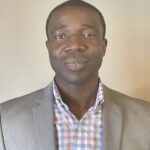
After residency, Dr. Elechi moved back to Wisconsin where he was a pioneer in developing a successful de-central pharmacy practice at Aurora Medical Center Kenosha, a 70 bed hospital in southeast Wisconsin. In 2016, Dr. Elechi moved to Mayo Clinic in Rochester, Minnesota. His interest in pain management has led him to participate in piloting opioid tapering programs that sought to educate patients on how to effectively taper off narcotic medications after orthopedic surgeries in a timely manner in an effort to counter the opioid epidemic in the nation. He precepts fourth year pharmacy students and leads topic discussions quarterly for the students. Dr. Elechi’s other interest include drug design, a focus of his undergraduate degree and future research emphasis.
Olabisi Falana, PharmD
Dr. Olabisi Falana is the Director of Graduate Pharmacy Education and Clinical Manager of Pharmacy Education at the University of Chicago Medicine (UCMC). She received her Pharm.D. from University of Wisconsin-Madison School of Pharmacy in 2011. After graduating from pharmacy school, she completed a PGY-1 pharmacy residency at Rush University Medical Center in Chicago, IL, and then completed he PGY-2 critical care pharmacy residency at Midwestern University Chicago College of Pharmacy in Downers Grove, IL.
At UCMC, Dr. Falana is responsible for thirteen pharmacy residency programs at UCMC, including managing 25 pharmacy residents and over 200 students from four colleges of pharmacy in the Chicagoland area. She also holds appointments at several colleges of pharmacy in Chicago. Her clinical practice area is in critical care, where she collaborates with physicians, nurses, other interdisciplinary team members, and a variety of learners from health professions schools. In addition to being an ICU pharmacy specialist, some of her other responsibilities include providing student and resident orientations, training new pharmacists and pharmacy residents on targeted critical care topics during the onboarding process, serving as a liaison between UCMC and pharmacy schools, and providing direct precepting and mentorship to pharmacy learners. With a broad background in critical care, her research has primarily focused in the Neurocritical Care and Neurology field.
Olayinka Olagbegi-Adegbite, PhD

Hannah Amaza, MA
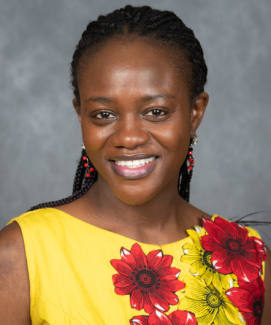 Hannah Amaza is the Engagement Core Project Manager in the Alzheimer’s Disease Neuroimaging Initiative (ADNI).
Hannah Amaza is the Engagement Core Project Manager in the Alzheimer’s Disease Neuroimaging Initiative (ADNI).
Victoria Obatusin, PhD
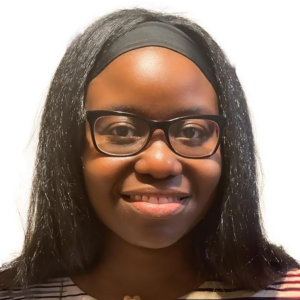
Dr. Obatusin is married with a beautiful baby girl. When Dr. Obatusin is not working, participating on a board, or parenting, she can be found enjoying a Korean drama or Nigerian movie, eating international delicacies or simply relaxing at home!
Victoria Obatusin received her PhD in Educational Leadership and Administration from the University of Wisconsin-Madison in 2023. Her research focuses on African international students, their social and emotional well-being, and the impact of social media.
Claudette Adegboro, MD
Claudette Adegboro is an Assistant Professor at UW Health and a board certified Pediatrician and Neonatologist. She completed her MD at the Ross University School of Medicine and completed residencies at both Mount Sinai Children’s Hospital in Chicago and UW Health.
Brittny Major-Elechi, MS
Brittn
Debra Browne

Pastor Emma Wawa
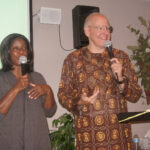
Dr. Emmanuel Sampene
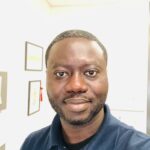
Dr. Rachel Ajayi
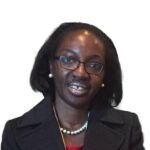
She is on the board of the Product Stewardship Institute and on the training committee of the North American Hazardous Materials Management Association. Racheal holds an M.Phil. In Environmental Management from the University of Cape Town and a Ph.D. in environmental management focusing on circular economy, zero waste and food waste from Griffith University in Australia. She presents at both local and international conferences such as International Impact Assessment Association, Waste Expo etc. She is a reviewer for top impact journals such as Stoten. Her interests include nature, reading, networking, music and volunteering at charitable organizations.
Deacon Omobolanle Olubi
Dr. Osas Olurotimi
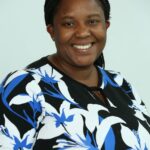
Before enrolling in her Ph.D. program, Osaretin earned her Master of Public Administration in Development Practice from Columbia University’s School of International and Public Affairs. Professionally, she has served in roles that sought to advance the national development of her home country, Nigeria. In her last role before beginning her doctoral studies, she served as the program manager at the Education Partnership (TEP) Nigeria. At TEP, she led the planning and implementation of consulting projects to provide design, monitoring, evaluation, and learning (MEL) and scaling-up support for multi-sectoral partnership programs. Also, she managed the implementation of a national survey of about 50,000 children in 20,000 households in 6 Nigerian states. This survey provided vital data to guide the country’s education officials in responding to the needs of the children. In addition to program management, she successfully led the delivery and expansion of capacity-building services for third-party organizations.
Overall, her research and professional goals are to inform policy, programs, and praxis to improve the lives of poor and vulnerable people.
Dr. Maryann Egbujor

Sandrine Lengue, MBA
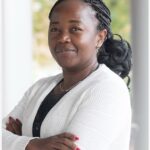
Dr. Dan Okoli

Prior to NAU, Dr. Okoli held planning and development leadership roles at the University of Wisconsin Pace University and The Ohio State University. He has taught mathematics, physics, architecture, computer-aided drafting and design, and African American studies at the undergraduate level.
He holds a Ph.D. from Colorado State University, an M.B.A. from the University of Arizona, a master’s in architecture and an M.A. in humanities from The Ohio State University, and a B.S. in structural engineering and architecture from the University of Aston.
As UC Merced’s chief operating officer, he will oversee physical operations, planning and development; design and construction management; environmental health and safety; facilities management, including central plant operations, custodial services, grounds maintenance, physical plant operations, and mail services; fire and building safety; physical and environmental planning and space planning; police and emergency management; and sustainability.
Mr. David Ogunnoiki
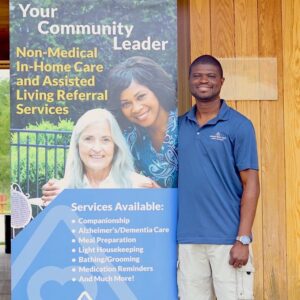
Dr. Iliya Amaza

Dr. Adefunke DadeMatthews

Her research interests primarily involve strategies to understand and improve mental and physical health outcomes among children and adolescents, especially underserved and minority groups and the dynamics of how this information can improve health policies. Additional research interests include examining factors related to sickle cell disease and interventions that can improve clinical outcomes.


